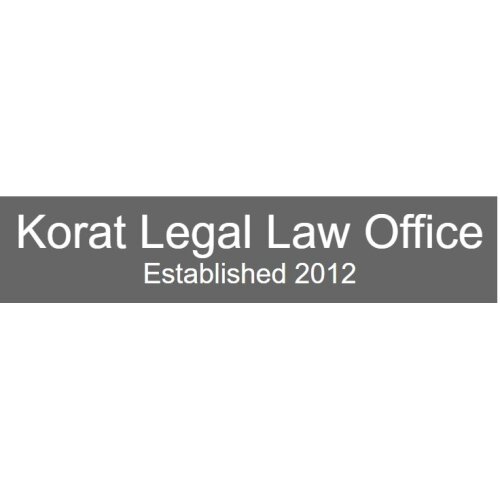Best Water Law Lawyers in Nakhon Ratchasima
Share your needs with us, get contacted by law firms.
Free. Takes 2 min.
List of the best lawyers in Nakhon Ratchasima, Thailand
About Water Law in Nakhon Ratchasima, Thailand
Water law in Nakhon Ratchasima is part of Thailand's broader regulatory framework meant to manage and protect the country's water resources. The region, also known as Korat, is a growing urban and agricultural hub within the Northeast of Thailand and faces unique challenges such as seasonal droughts, flooding, irrigation needs, and water pollution. Water law addresses issues of ownership, allocation, access, pollution control, and disputes over water usage. Both national and local laws interact to regulate water use for agriculture, industry, drinking water, and environmental protection in Nakhon Ratchasima.
Why You May Need a Lawyer
Water resources are vital to daily life and economic activities in Nakhon Ratchasima, from rice farming to manufacturing. You may require a lawyer specializing in water law for the following common reasons:
- Resolving disputes over water rights and land boundaries near rivers, canals, or reservoirs
- Addressing pollution, contamination, or illegal dumping affecting your property or community
- Seeking permits for water extraction, irrigation, or industrial use
- Responding to accusations of violating water use regulations
- Negotiating compensation if your land is impacted by government water projects such as dam construction or river dredging
- Participating in community or environmental actions related to water conservation and access
Local Laws Overview
Thailand’s national water management law, the Water Resources Act B.E. 2561 (2018), sets the foundation for local laws. In Nakhon Ratchasima, local authorities implement and enforce these rules including issuing water extraction permits, monitoring water quality, and resolving local water disputes. Key aspects of local water law include:
- Water Ownership: Water is state property and regulated for the common good. Individuals and businesses require official permission for large-scale extraction or alteration of water bodies.
- Permit System: Any significant water use for agriculture, industry, or commercial activities typically needs approval from local authorities.
- Discharge and Pollution Control: Laws regulate sewage and industrial waste disposal into rivers, lakes, and reservoirs. Violators can face fines or criminal charges.
- Community Water Groups: In rural areas, community organizations often help distribute water fairly among farmers, sometimes supported by local regulations.
- Flood and Drought Management: Special provisions exist for managing water use during emergencies, with local authorities empowered to enforce rationing or diversion of water flows as needed.
Frequently Asked Questions
What is considered public water versus private water in Nakhon Ratchasima?
Most surface water resources such as rivers, canals, and lakes are considered public and are managed by the state. Private water sources usually refer to wells or rainwater collected on private land, but the use may still be regulated.
Do I need a permit to dig a well on my property?
If the well is for domestic, small-scale use, a permit is typically not required. However, if the well is for agricultural, industrial, or large-scale purposes, obtaining a permit from local authorities is usually necessary.
Who is responsible for managing water delivery for agriculture?
Irrigation offices under the Royal Irrigation Department manage primary water delivery systems, while local government agencies and community water user groups often oversee secondary and small-scale distribution.
Can the government take my land for water projects?
Yes, under eminent domain laws, the government can expropriate land for public water infrastructure, but you are entitled to fair compensation according to established procedures.
What are the penalties for polluting water sources?
Penalties range from fines to imprisonment depending on the severity and intent of the pollution, as well as the environmental damage caused.
How can I resolve a water dispute with my neighbor?
Local administrative organizations often provide mediation services for minor disputes. For more serious cases, you may need to seek legal advice or pursue the case through local courts.
Is rainwater harvesting regulated?
Rainwater harvesting for domestic or small-scale agricultural use is generally permitted. However, large-scale projects may require notification or approval from local authorities.
What should I do if my land is flooded due to a government water project?
You may be eligible for compensation. Contact the relevant government agency first, and if necessary, consult a lawyer who can help you negotiate or file a formal compensation claim.
Are there special rules for factories or businesses using water?
Yes, factories and businesses must comply with stricter regulations regarding water extraction, treatment, and disposal. Violations can lead to permit revocation, fines, or other penalties.
Can local communities form their own water user groups?
Yes, local communities are encouraged to organize officially recognized water user groups to manage, distribute, and conserve water resources, particularly in rural areas.
Additional Resources
For those seeking more information or assistance related to water law in Nakhon Ratchasima, these resources may be helpful:
- Royal Irrigation Department (RID) - Regional Office
- Office of Natural Resources and Environmental Policy and Planning (ONEP)
- Nakhon Ratchasima Provincial Government
- Local administrative organizations (such as Tambon Administrative Organizations or TAOs)
- Non-governmental organizations focused on sustainable water management and community cooperation
- Environmental law legal aid centers
Next Steps
If you need legal assistance with a water law issue in Nakhon Ratchasima:
- Document your situation with as much evidence as possible including photos, official correspondence, and maps
- Reach out to local authorities or administrative offices for initial clarification or mediation when appropriate
- If the issue remains unresolved or is complex (for example, legal claims, compensation demands, or regulatory violations), consult a lawyer who specializes in water law or environmental law
- Ask any legal professional you contact about their experience with local water law and their approach to resolving similar cases
- Continue to gather and organize supporting documents while working with your legal advisor
Taking these steps will help you protect your rights and ensure proper management of water resources in Nakhon Ratchasima.
Lawzana helps you find the best lawyers and law firms in Nakhon Ratchasima through a curated and pre-screened list of qualified legal professionals. Our platform offers rankings and detailed profiles of attorneys and law firms, allowing you to compare based on practice areas, including Water Law, experience, and client feedback.
Each profile includes a description of the firm's areas of practice, client reviews, team members and partners, year of establishment, spoken languages, office locations, contact information, social media presence, and any published articles or resources. Most firms on our platform speak English and are experienced in both local and international legal matters.
Get a quote from top-rated law firms in Nakhon Ratchasima, Thailand — quickly, securely, and without unnecessary hassle.
Disclaimer:
The information provided on this page is for general informational purposes only and does not constitute legal advice. While we strive to ensure the accuracy and relevance of the content, legal information may change over time, and interpretations of the law can vary. You should always consult with a qualified legal professional for advice specific to your situation.
We disclaim all liability for actions taken or not taken based on the content of this page. If you believe any information is incorrect or outdated, please contact us, and we will review and update it where appropriate.









